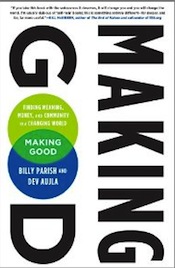
It seems like everyone has a story of how they first heard of Dev Aujla. Making Good co-author, environmental activist Billy Parish, is no exception. “He was kind of a mystical figure in the youth-organizing world of Canada,” Parish writes in the book’s first pages.
Well-known in the non-profit, social entrepreneurship and youth engagement sector, Aujla is also no stranger to Verge. In 2010, he was the keynote speaker at the Go Global Expo, where his address focused on how to make money and change the world.
That’s why it came as no surprise when we learned that Aujla, along with Parish, was releasing a book focused on how to find meaning, make money and build communities in a changing world. The book, Making Good, provides career advice for “Rebuilders,” or people who are interested in making good and making money.
Rather than acting as a definitive how-to guide for social entrepreneurs, the book serves as an inspiration point. By outlining opportunities in a range of industries, relating anecdotes from the authors’ own careers and providing daily exercises, Making Good serves as reassurance that it's possible to make a career out of social change.
This past weekend, Aujla and I spoke about the role that travel plays in making good—and making money.
The message in Making Good that really resonated for me was the idea that easily definable and linear career paths are dying. I also appreciated the emphasis on the importance of establishing work-life balance. As an individual who splits your time between New York and Toronto, do you ever find it difficult to maintain that balance?
One of the disciplines in the book is about the power to choose. It’s the ability to remember that you always have choice over what you’re going to do right now. It enables you to choose everything from a better place and get more done.Taking the time to reflect can actually make things move a lot faster.
You write about the importance of reflection and open-mindedness, as well as the clarity of perception that comes from travelling. Why is it important to carry that mindset into your everyday life?
Sometimes when you come back after a trip, you fall into a routine. You forget to find that astonishment or new way of looking at things within your city or within your routine.
It’s triggered automatically when we’re in that travel mode, but what I find fascinating is that each of us can find that newness in our everyday lives. It’s one of those things that spurs creativity or can bring on new ideas. You need to go away or into that space where you’re actually alone to make sense of it all.
When was a time that travel allowed you to find that clarity and sense of purpose?
One of my favorite trips is when I went to Malaysia and biked down the East Coast. I flew into the far North, found a little bike shop and bought a bike. I stopped along the way and talked to people about the disappearance of turtles—I was really into turtles at the time.
[On the trip] I found myself going along a little side road towards the water and [found] this beach resort that had been abandoned years ago. There was absolutely nobody around. Zero people. You could just disappear.
It was one of those moments where being that alone brings on so much. It was an amazing experience—it let me bring together all the stuff I’d been thinking about.
One of the suggested exercises in Making Good is to build a “course pack,” or a book of articles and newspaper clippings that provide motivation. In your course pack, were there any travelers that you looked to for inspiration?
One of the people I had in my course pack was David Mayer de Rothschild. He founded an organization called Adventure for Ecology, which is based on adventure travel with a social mission. He retraced the path of the Kon-Tiki expedition by making a boat, called the Plastiki, out of plastic bottles. It raised awareness about plastic bottles and how they end up in the ocean. He’s a fascinating guy.
As funding changes occur for international development, non-profit and volunteer-sending organizations, what role do you think Rebuilders will play?
There’s a need for people to learn about the rest of the world and that need is going to get fulfilled no matter what. It’s a real opportunity for people to rethink how travel abroad happens.
We’ve been relying on [government and foundation funding]. But what does it look like when we have to take it upon ourselves? We can do it with others—we don’t have to do it alone. But we can’t rely on some of the institutions that we’ve been relying on.
There’s a role for groups who are trying to do travel abroad in a way that’s holistic, based on community needs and not just voluntourism. That’s what the book is premised on—for-profits can be just as mission-focused as the non-profits.
What is your organization, DreamNow, up to at the moment?
We’re launching a job-training program that’s based on the information in the book. Making Good is about showing people that it’s possible to make money and change the world. The job-training program is to get people the actual skills and actualize some of the stuff that we talk about. You can find out more about it on makinggood.org.
